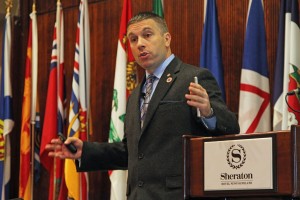 Effective communication is a challenge that we face in every facet of emergency response. One of the most difficult challenges encountered by new educators and leaders looking to move “from buddy to boss” is building credibility and personal authority. Many of us work hard at it every day of our career and get it right most of the time, but my opportunity to spend time critiquing and being critiqued by professional communicators has shown me how often we undermine ourselves with our own weakening words.
Effective communication is a challenge that we face in every facet of emergency response. One of the most difficult challenges encountered by new educators and leaders looking to move “from buddy to boss” is building credibility and personal authority. Many of us work hard at it every day of our career and get it right most of the time, but my opportunity to spend time critiquing and being critiqued by professional communicators has shown me how often we undermine ourselves with our own weakening words.
Weakening words. We use them all the time at work, at home, and when we’re out in public. They sneak into our vocabulary when we’re not paying attention, and we begin to use them out of habit and like most habits, while we don’t realize it, everybody else sees us do it every time. They undermine every message we’re trying to communicate. When we’re using them, it’s like we’re saying one thing while holding up a sign that says “But not really!”
It isn’t just the verbalized pauses: “um, er, uh, well”. They interrupt your message, and make you seem that you’re unsure and don’t know what you’re talking about. We all still use these from time to time, but most trained leaders and educators have practiced eliminating them. If you never have or haven’t in a while, now is the time to record yourself and see how you’re doing.
Then there are the disqualifiers: “Like, sort of, you know, just, kind of, in a way”. These are phrases you may not even realize are coming out of your mouth that take what you’ve just said, and unsay it. When someone says in an interview, “I was sort of in charge.” they are saying “I was not in charge.” When a leader says, “We should, like, you know, clean up the station better.”, he or she is saying, “I got yelled at so I’m supposed to seem like I’m saying something, but go about exactly as you were.”
Like all words and phrases in the English language, even the seven that you can’t say on television, these words do serve a purpose. When used intentionally, they can blunt the impact of a difficult conversation. But far more often they’re bad habits, verbal crutches, or signs of insecurities bubbling to the surface. If what you mean to say in the interview is, “I had a supervisor for this assignment, but I was responsible for the project’s success by demonstrating the following abilities…” Then say that and list the abilities you demonstrated that you would like the interview panel to know about. There should be no “sort of” about it. If you were telling teammates or subordinates that there is going to be a change in the cleaning practices in station, then let them know why and what we’re going to do about it. To add these disqualifiers to the conversation says that you’re either telling people who aren’t going to do it anyway, or for some reason you’re telling people who already ARE cleaning. Either way what you’re saying and the way you’re saying it is just a waste of time and energy, and is going to aggravate everyone involved.
And finally, the minimizer’s: “I’d like, it’d be great, could we, maybe we should”. Again, there is a use for these phrases to ease difficult conversations, but how many times have you heard people use these phrases as leaders, or educators, and then later watch them wonder why no one took their message seriously. “It’d be great if we could wear our personal protective gear when we go out on emergency calls.”, “I think maybe we should try a little better to check our equipment in the morning.”, “Could we aim for signing on for emergency calls a little bit faster?” If you want to solicit input from the group, there’s nothing wrong with that. However, if you want to make a statement, make a statement.
- Get to the point.
- Tell them why.
- Set effective goals.
- Show them the path.
But make a statement that says something, not one that, um, sort of, you know, you’d like to make a statement, maybe, if that’s cool.
- Verbalized Pauses
- Disqualifiers
- Minimizers
GET RID OF THEM.
What you say, and how you say it is speaking volumes about you as a leader, as an educator, and as a person. Today is the day to check yourself to make sure you’re telling people what you want them to hear. Do it now.
 Rescue Digest Helping You Help Others
Rescue Digest Helping You Help Others